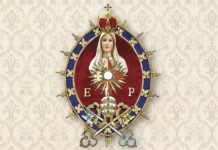S alvation history can be summarized in terms of providential encounters. Joshua, in the service of Moses from his youth (cf. Nm 11:28), received from him the mandate to bring the people into the Promised Land. Elijah, at the height of his vocation, met Elisha and left him double his spirit as his inheritance (cf. 2 Kgs 2:9). The mission of John the Baptist was so closely interwoven with that of the Divine Master that some thought he was Christ himself (cf. Lk 3:15).
Jesus, for His part, “went about doing good” (Acts 10:38), regardless of the place or circumstances: it could be at a tax collector’s booth, where He called the publican Matthew to abandon everything in order to find the true treasure; at Jacob’s well, where He quenched His thirst by winning the soul of the Samaritan woman; or in the dead of night, as in the eloquent dialogue with Nicodemus.
Later, St. Augustine’s encounter with St. Ambrose, that of St. Clare with St. Francis of Assisi, or that of St. John of the Cross with St. Teresa of Avila, would serve as illustrations of how the missions of providential men are completed and heightened in their encounter, particularly in the life of the founders. To a Benedictine, for example, sanctification consists largely in a personal relationship with “Father Benedict”; that is to say, for them sanctification is essentially a “Benedification”.
On the other hand, the life of providential men and women is also full of “clashes”: persecutions by tyrannies in every age, betrayals devised by malcontents and even conflicts with sectors of ecclesiastical power, as in the case of the infamous condemnation of St. Joan of Arc.
This month marks a very special date in the history of the Heralds of the Gospel and – why not say it? – of the Church. Exactly sixty-five years ago, on July 7, young João met his master, model and guide, Plinio Corrêa de Oliveira. That first meeting in the Basilica of Our Lady of Carmel in São Paulo already contained the seeds of all the fruits that this work would later produce. In fact, it was precisely because of that union of hearts that many initiatives came to be born, such as, for example, the institution of a germ of community life, combining contemplation and action, from the entity’s early beginnings.
The lives of both were marked by many “clashes”, as has happened in the past within other foundations: misjudgements on the part of civil and ecclesiastical authorities, internal and external persecutions, betrayals of all kinds. But these “clashes” have never had and never will have any power against the unique and inseparable mission of both, for a very simple reason: providential men have been entrusted with a central role in the history of the Church, and “the gates of hell shall not prevail against her”(Mt 16:18). ◊

Dr. Plinio Corrêa de Oliveira, in September of 1982



